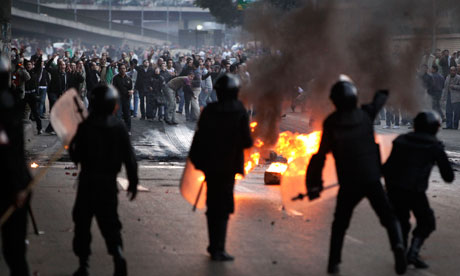Demonstrators and police play violent game of cat and mouse through Cairo's streets amid calls for restraint
- guardian.co.uk,

Running battles between police and anti-government protesters continued in Egypt for a second day, despite the declaration of an official ban by the government on protests and gatherings, and a massive deployment of police in the country's capital.
Riot police and plain clothes officers armed with staves and bars broke up a demonstration outside one of Cairo's biggest tourist hotels, the Ramses Hilton, on the banks of the river Nile.
Tonight groups of demonstrators and police are still playing a violent game of cat and mouse through the city centre's streets – with protesters quickly re-grouping after being broken up.
The sound of police sirens and detonating tear gas canisters could be heard across the city, in the biggest protests against the regime of 82-year-old president Hosni Mubarak in three decades.
Protests took place across Egypt, with gatherings broken up by police outside a number of locations in the capital, including Cairo's supreme court, Nasser metro station and on Ramses Street.
Police continued to round up scores of people, including photographers and reporters covering the demonstrations. The latest clashes occurred on a day when officials announced that 860 people had been rounded up following mass protests against Mubarak on Tuesday, when at least four people died.
The crackdown by authorities brought harsh words from European leaders, who expressed concern and said the events underlined the need for democratisation and respect for human and civil rights.
One of the toughest comments came from German foreign minister Guido Westerwelle, who said he was "extremely concerned" and called on all involved to show restraint.
"We are seeing in the last few weeks that a country's stability is not endangered by granting civil rights. It is through the refusal of civil and human rights that societies become unstable," he said in a reference to Tunisia.
British foreign secretary William Hague said: "We deeply regret the loss of life in the Egyptian protests. All parties should show restraint and avoid violence. It is important that the government listens to the concerns of those demonstrating and respects rights of freedom of assembly and expression. Openness, transparency and political freedom are important tenets of stability. We urge the government and demonstrators to seek a peaceful way forward."
Hillary Clinton did not criticise Egypt's government – a key American ally in the Middle East – saying only that the country was stable and Egyptians have the right to protest while urging all parties to avoid violence.
"We believe strongly that the Egypt government has an important opportunity at this moment in time to implement political, economic and social reforms that respond to legitimate needs and interests of the Egyptian people," she said at a news conference with visiting Jordanian foreign minister Nasser Judeh.
Many of those demonstrators admit to being inspired by the Jasmine revolution in Tunisia, and have adopted some of the same chants and slogans.
As in Tunisia, Egyptian opponents of Mubarak have been quick to utilise social networking sites to organise protests, although those appeared to be working intermittently amid claims – denied by the government – that Facebook, at least, had been shut down.
"Mubarak never experienced this level of public anger and such a rejection of his legitimacy in 30 years of power," said political analyst Issandr El Amrani. "This looks quite bad for him."
That is particularly true in the year of presidential elections. Some had believed that Mubarak would try to hand over power to his son Gamal, which is opposed by many Egyptians as well as the military according to the WikiLeaks cables.
Indeed one the chants that has been taken up in Cairo has been: "Gamal, tell your father that Egyptians hate you."
Today's crackdown came after Egypt's interior ministry delivered an ominous warning that police would not tolerate any gatherings, and deployed armoured vehicles on key bridges across the Nile as well as at major intersections, squares and government buildings.
Elsewhere in the country a crowd of about 1,000 people gathered outside the morgue in Suez to protest against the death of one of three protesters who died in clashes on Tuesday.
Sphere: Related Content
![Validate my Atom 1.0 feed [Valid Atom 1.0]](valid-atom.png)
























































Nenhum comentário:
Postar um comentário